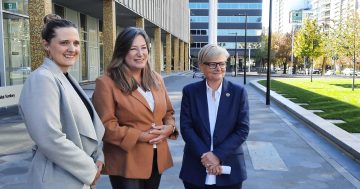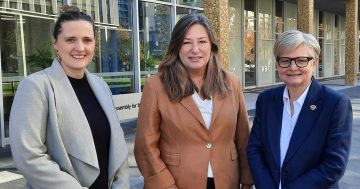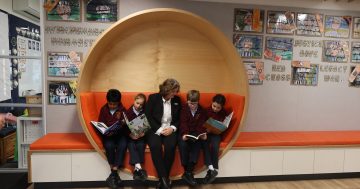
The inquiry has been told that the many varied learning approaches in Canberra public schools are causing problems. Photo: File.
The teachers union has criticised the diversity of learning approaches among Canberra’s public schools, calling for greater central control of curricula.
In its submission to the inquiry into literacy and numeracy in ACT public schools, the Australian Education Union also warns of powerful commercial interests pushing simplistic teaching approaches by spreading misinformation about the ACT’s school performance.
But the inquiry has also heard from teachers who say they have been told not to use phonics in teaching reading, that explicit teaching is frowned on, and that inquiry-based learning is clearly favoured.
The AEU blames a lack of system leadership for the many varied approaches taken by individual principals, although it warns against any reform that ignores their work.
It says the result is an inefficient, patchwork system that has as many learning programs and approaches as there are schools.
“The lack of system coherency presents challenges to staff in the context of teacher mobility, which is a hallmark of ACT public schools,” it says.
“Whenever students or staff move, even to the next suburb over, they might be expected to adjust to a different approach to teaching and learning.”
The union says this creates anxious parents who can be influenced by media campaigns that attempt to discredit some approaches to teaching in our schools.
“In the ACT, powerful voices have deployed significant resourcing to repeat claims in the media that one approach to teaching is backed by ‘science’ and ‘evidence’, and all others are not,” it says.
“This campaign has long roots in other countries like the United States and borrows ideological framings that discredit public school teachers, arguing that a teacher’s professional discretion should be replaced with commercial programs sold for profit to public school systems.”
While it does not support mandating how teachers teach, the AEU suggests that a move towards strengthening centralised support in assessment, reporting and teaching will assist schools considerably.
Another submission from the Alliance for Evidence-Based Education – which includes teachers, academics, psychologists, speech pathologists, occupational therapists and parents – also criticises the many differing approaches in ACT public schools and says it is time to rethink school autonomy.
“The variability in approach across schools creates high levels of inefficiencies with increased preparation time, assessment and reporting in each school, with minimal accountability for students’ poor performance from year to year,” it says.
However, while the AEU argues that the ACT system is still the best-performing in the country, the Alliance says a significant number of students are leaving school without basic literacy and numeracy skills.
It says ideology and culture are trumping evidence in teaching practice, and the current environment in ACT schools is preventing teachers from speaking out, including those who have contributed anonymously to the Alliance’s submission.
“Many of us have been explicitly told not to teach or use phonics, not to use decodable readers, we have had to teach these skills to students in secret and consequently, choose who we tell (which colleagues) or where we teach (which schools),” the Alliance says.
“We know the research evidence. Yet we work within an education setting that preferences inquiry-based instruction, balanced literacy, and pedagogy which does not meet the needs of all students.”
The submissions say many teachers end up leaving the profession either to the Australian Public Service or to schools and school systems that are embracing the evidence, such as the Catholic school system in Canberra, which is reporting improved student performance since changing its approach several years ago.
It also says teachers are not getting the training they need at university and the Directorate’s professional development program is inadequate.
“Many of us were trained at university in inquiry-based learning and this methodology is very popular across Canberra’s schools,” the submission says.
“The research is clear that explicit instruction is a much more effective approach.”
However, the AEU says the notion that Canberra public school teachers do not use or are discouraged from using explicit instruction is a myth.
“The Australian Curriculum is complex and comprehensive. It would be impossible to impart such a wide set of knowledge to children without clear and explicit instruction.
“Our teachers use explicit instruction alongside careful scaffolding and guided inquiry to make sure every child is supported to learn.”




















